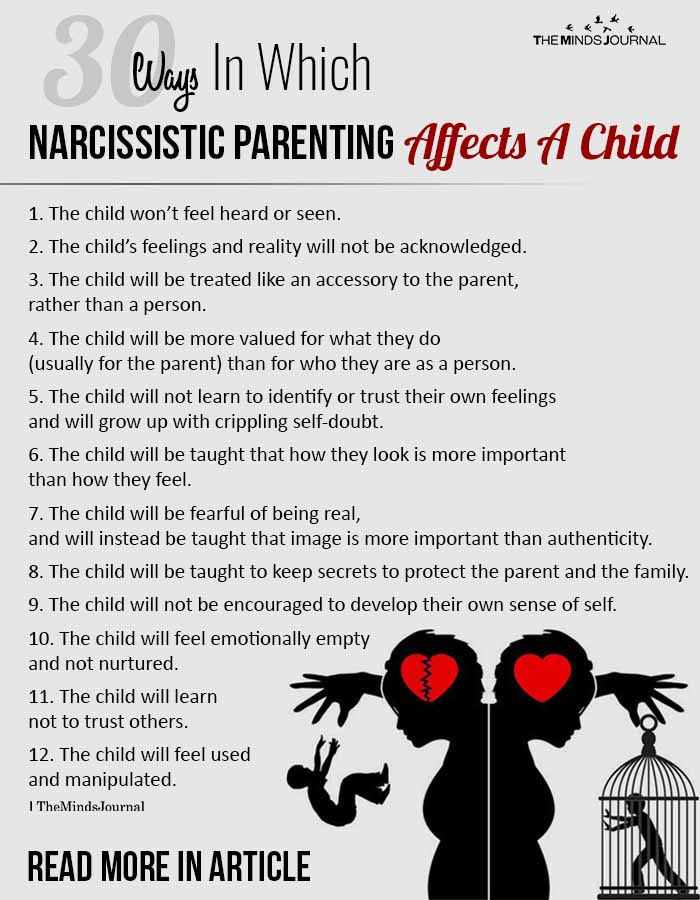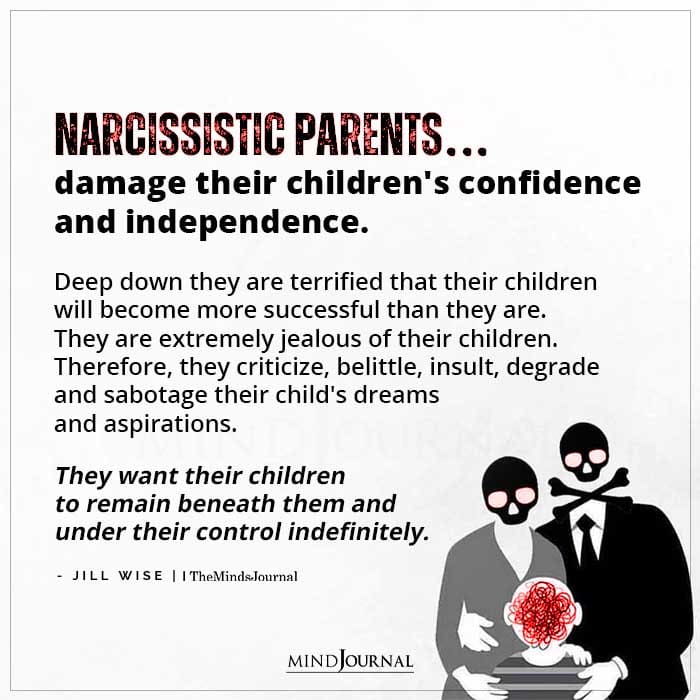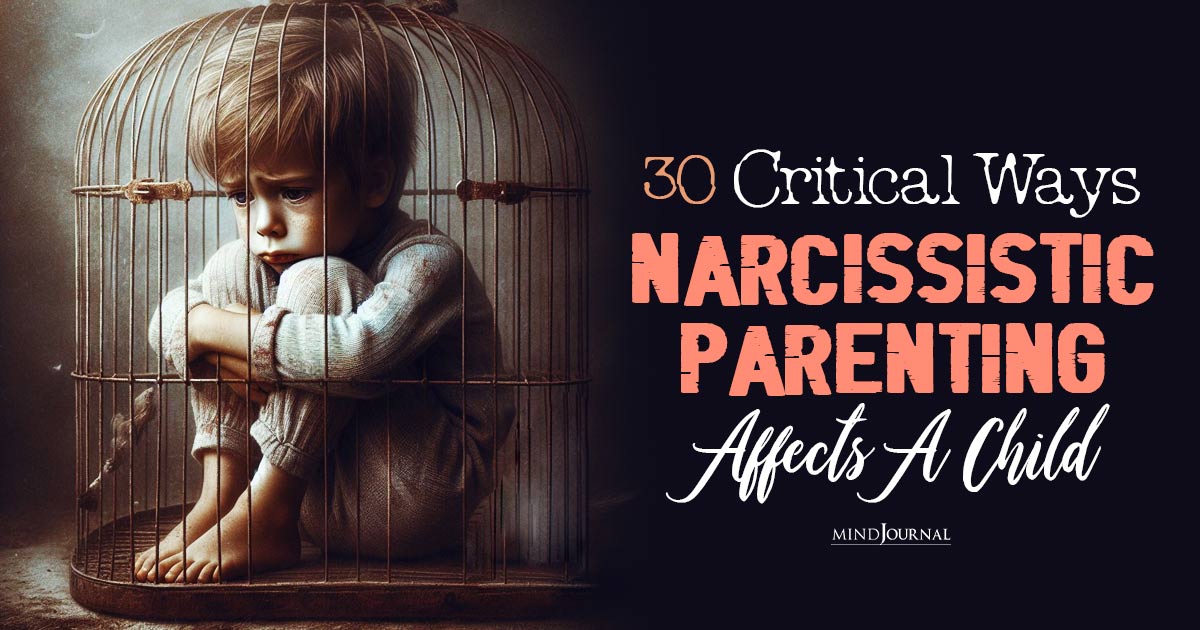Narcissistic parenting can have a heavy impact on a child’s psyche, and their emotional and psychological development, and well-being. The effects of narcissistic parenting can be far-reaching. Explore 30 ways how narcissistic parenting affects a child.
Why does it matter if a parent is a narcissist? How does that hurt a child?
You may be asking these questions if you are a person co-parenting with a narcissistic ex; someone raised by a narcissistic parent; one who is in a relationship with a narcissist; or maybe a divorce professional working on a case that involves a narcissistic parent.
Given my research and clinical experience, I want to provide some education and awareness about how this disorder hurts children.
First, let me explain that narcissistic personality disorder (NPD) is misunderstood when applied to someone who is just boastful, arrogant, and all about themselves.
While these traits are annoying and not fun to be around, narcissism is a deeper, more destructive disorder that has devastating effects on the people in relationships with the individual.
It’s a difficult disorder to treat; many believe it is untreatable. The cornerstones of the disorder are a lack of empathy and the inability to tune into the emotional world of others.
So how does narcissistic parenting affect children?
Related: 24 Characteristics of Narcissistic Mothers
30 Ways In Which Narcissistic Parenting Affects A Child

1. The child won’t feel heard or seen.
2. The child’s feelings and reality will not be acknowledged.
3. The child will be treated like an accessory to the parent, rather than a person.
4. The child will be more valued for what they do (usually for the parent) than for who they are as a person.
5. The child will not learn to identify or trust their own feelings and will grow up with crippling self-doubt.
6. The child will be taught that how they look is more important than how they feel.
7. The child will be fearful of being real, and will instead be taught that image is more important than authenticity.
8. The child will be taught to keep secrets to protect the parent and the family.
9. The child will not be encouraged to develop their own sense of self.
10. The child will feel emotionally empty and not nurtured.
11. The child will learn not to trust others.
12. The child will feel used and manipulated.
Related: 13 Ways Being Raised by a Narcissist Can Affect You
13. The child will be there for the parent, rather than the other way around, as it should be.
14. The child’s emotional development will be stunted.
15. The child will feel criticized and judged, rather than accepted and loved.
16. The child will grow frustrated trying to seek love, approval, and attention to no avail.
17. The child will grow up feeling “not good enough.”
18. The child will not have a role model for healthy emotional connections.

19. The child will not learn appropriate boundaries for relationships.
20. The child will not learn healthy self-care but instead will be at risk of becoming codependent (taking care of others to the exclusion of taking care of self).
21. The child will have difficulty with the necessary individuation from the parent as he or she grows older.
22. The child will be taught to seek external validation versus internal validation.
23. The child will get a mixed and crazy-making message of “do well to make me proud as an extension of the parent, but don’t do too well and outshine me.”
24. The child, if outshining the parent, may experience jealousy from the parent.
25. The child is not taught to give credit to self when deserved.
26. The child will ultimately suffer from some level of post-traumatic stress disorder, depression, and/or anxiety in adulthood.
27. The child will grow up believing he or she is unworthy and unlovable, because if my parent can’t love me, who will?
28. The child is often shamed and humiliated by a narcissistic parent and will grow up with poor self-esteem.
29. The child often will become either a high achiever or a self-saboteur, or both.
30. The child will need trauma recovery and will have to re-parent themselves in adulthood.
Being raised by a narcissistic parent is emotionally and psychologically abusive and causes debilitating, long-lasting effects on children.
Related: Six Kinds of Emotional Abuse by Narcissistic Parents
It is often missed by professionals, because narcissists can be charming in their presentation, displaying an image of how they wish to be seen.
Behind closed doors, the children feel the suffocation of self and struggle with loneliness and pain. The narcissist is not accountable for their own mistakes or behavior, so the child believes they are to blame and that they flunked childhood.
Having worked as a mental health provider with thousands of children, as well as the adult children of narcissistic parents, I see the above symptoms again and again.
The lifestyles differ, and the stories differ, but they all wave the same emotional banners. It’s quite a list. It takes serious recovery work to get better and feel better.

If you are the other parent, or part of the extended family, and are trying to ward off the effects of a narcissistic parent, you will have double duty as the responsible one.
The best approach is to parent with empathy — the antithesis of narcissism. If you are a divorce professional working with a case that involves a narcissist, help the kids by first really understanding the dynamics of this disorder.
Don’t minimize it. Make sure the children are in therapy and are learning assertiveness skills to use with a parent who does not emotionally tune into them. Put the kids first.
Related: The Narcissistic Family Tree: 12 Common Dynamics of a Dysfunctional Family
Note: Narcissism is a spectrum disorder, so think of it as a continuum ranging from low-level traits that we all have to some degree to a full-blown personality disorder. The higher the level of traits, the more damage gets done to children.
Written by Karyl McBride Originally appeared on Psychology Today
Frequently Asked Questions
How do you comfort someone who has narcissistic parents?
Create a safe space and listen to them without interrupting. Be compassionate and don’t blame them. Let them know that their feelings are valid. They might be programmed to see this behavior as normal, so be patient through the healing process.
How do you deal with a parent who is a controlling narcissist?
First, accept the reality and let go of any expectations. Identify the manipulative tactics and be self-confident. Seek support from others. Lay firm boundaries and cut off the parent from your life, if you have to.
How do you outsmart a narcissistic parent?
Stop being invested in them. Heal and get emotionally independent. Don’t respond to them and disengage yourself from any communication. Be assertive, keep your plans secret, lean on your support systems, and stay calm.
How do I deal with a controlling narcissistic mother-in-law?
Accept the situation and clearly communicate with your spouse regarding your issues. Set and maintain strong boundaries. Don’t get emotional and never share your secrets with her. Talk to your loved ones and stay calm when she triggers you.














Leave a Reply